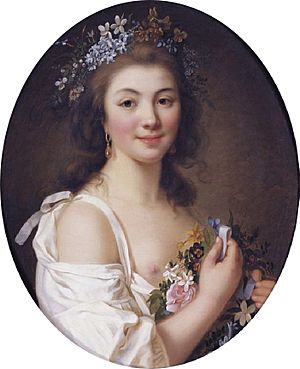Frankenstein's Promethean dimension facts for kids
Mary Shelley's famous novel, Frankenstein; or, The Modern Prometheus, tells the story of a scientist who creates a new kind of human being. This story reminds us of the ancient Greek myth of Prometheus. In that myth, Prometheus defied the gods. He stole fire to give to humans. In the novel, Victor Frankenstein also challenges what is considered right. He tries to create life, which was seen as a power only for a divine Creator.
The word "modern" in the title is important. It shows that the old myth is being updated. It connects to new scientific ideas and Christian beliefs of the time. The challenge to the Greek gods in the myth becomes a challenge to the Creator God in the novel. Even though Christian creation is different from making something, the idea of creating life is central.
The title of the novel also connects to a French philosopher named La Mettrie. In 1747, he wrote a book called Homme machine (Man a Machine). He called for a "new Prometheus." This new Prometheus would bring a human-like machine to life. Mary Shelley didn't invent this phrase. It was used by others, including Immanuel Kant. Frankenstein is more than just a story about science. It uses ideas from myths. It also explores deep questions about life, beauty, and right and wrong.
Contents
Myths and Frankenstein
Frankenstein reminds us of more than just the myth of Prometheus. It shares ideas with several other old stories.
Icarus

The novel is like the myth of Icarus. Icarus was a boy who flew too close to the sun. His wings melted, and he fell. Like Icarus, Frankenstein tries to go beyond human limits. He wants to create life. This ambition leads to his downfall.
Faust
The story also brings to mind Faust. Faust was a character who wanted to know everything. He made a deal with evil forces to gain knowledge. Mary Shelley suggests that too much knowledge can be dangerous. It can be like a "serpent's bite." This means that knowing too much can harm your soul.
Don Juan
There are also hints of Don Juanism. Don Juan was a character who was never satisfied. He always wanted more. In the novel, Frankenstein's search for knowledge is never truly fulfilled. The monster he creates appears and brings him great sadness. This is like a "psychological hell."
Pygmalion
Finally, Frankenstein reminds us of Pygmalion. Pygmalion was a sculptor from Cyprus. He fell in love with a statue of a woman he had carved. The goddess Aphrodite brought the statue to life. It became a real woman named Galatea. In Frankenstein, Victor creates a being. He hopes it will be beautiful, but it turns out differently. Mary Shelley knew this myth well. She had read it in different books and even knew an opera about it.

